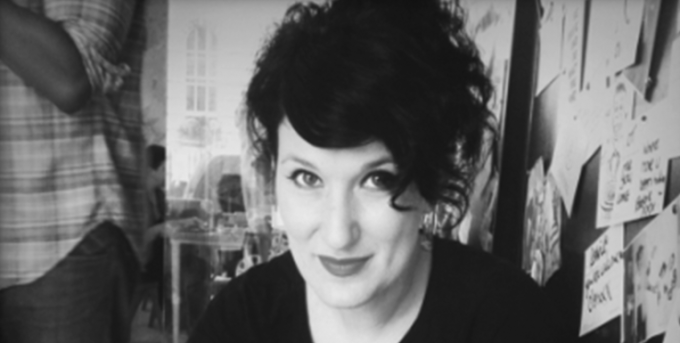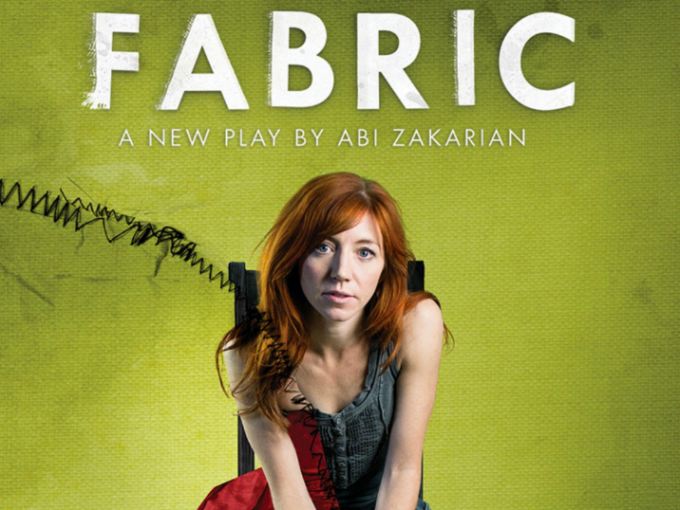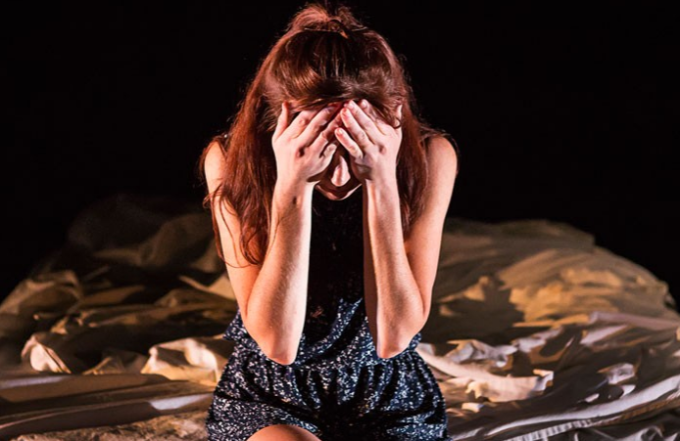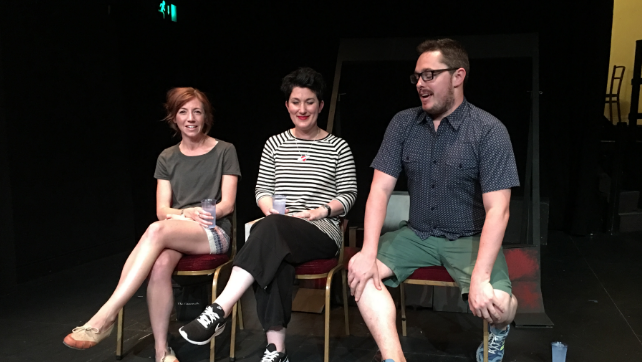
Abi Zakarian
Abi Zakarian is an exciting new playwright with previous works such as This Is Not An Exit produced for the RSC for The Other Place with transfer to the Royal Court and Swifter, Higher, Stronger produced at The Roundhouse. Abi has previously been a writer in attachment at Soho Theatre and and is currently a member of the RSC’s writers group. Fabric is Abi’s seventh play and has been toured across the UK with the Tremors theatre group finishing its run at the Edinburgh Festival Fringe 2016 on the 29th August.
Fabric has already been picked as a top show to see at the Fringe by the Guardian and has won a Fringe First and The Stage Edinburgh award. We were lucky enough to sit down with Abi and talk to her in more detail about her play fabric and and find out why it has got everybody talking.
What inspired you to write Fabric?
Well this play started a bit differently as it was as commissioned for a theatre company called Tremors. Tom O’Brian the director and Nancy Sullivan, who is the actress playing Leah, were looking for a one-woman show and then they couldn’t find anything, so they decided to commission a piece. I think that through the course of talking to various people my name came up so Tom arranged a meeting with me.
Tom relayed to me an idea as to what it was going to be about, relating to a woman in his family that was very specific and I said that I was much more interested in exploring the wider themes of inequality and gender issues. He then went away to think about it and came back with Nancy so that the three of us could talk through ideas. What excited us all was the idea of doing a show about a woman who represents all of the tiny almost unseen inequalities that happen everyday to women. We then decided to get together in a room for a week and workshop these ideas so that we could explore those issues.
So it wasn’t so much that I was inspired to write Fabric alone, but rather that I met the right team at the right time and it transpired that all of us wanted to write something about what it means to be a woman today.

Cover art for Fabric
Was collaboration an important part of the process?
Yeah it was. Even though I went away and wrote it and created the character of Leah, it was very much informed by that week in the workshop. It was also great to spend time with Nancy actually, to observe her and have a chance to see the actor’s physicality when creating the character – something that you really don’t often get a chance to do.
This shared interest of everyday inequalities; was it something that had previously interested you?
Yes and I am a feminist. But it’s not a big deal it’s just who I am.
I am always interested in writing about women. It’s just that there are so many stories yet to tell. Also there is this huge inequality out there that starts the minute you’re born female – that is the minute that these expectations are put upon you.
Leah is someone who doesn’t even know to question it because that’s ‘just how it is’ and she goes through life and grabs it with both hands. It is only later that she starts to see that perhaps that this isn’t the way that it has to be and there is a possibility of choice in her life.
Could you explain more about the character of Leah?
I wanted to write a character who isn’t just a nice middle-class women who has been to university and is familiar with her feminist ideology. She comes from a world that isn’t interested in the academic appraisals of the inequality and injustices of life. Leah is every woman, we all know Leah. I want everyone who comes to see it to feel like they too are a little bit of her.
She is deliciously uncomplicated but she is not an idiot. She is a smart woman who has got a career and she is doing what she wants and doing all of the things that you are supposed to do as a modern woman. But at the same time she still thinks that she wants to whole idealised dream – you’ll meet someone, you’ll fall in love, you’ll settle down, you’ll have kids, you’ll have a nice house, you’ll have lovely holidays – until suddenly it’s not quite what she wants but she hasn’t got the right tools to dissemble that, so she is just going through it.

Nancy Sullivan in Fabric, photo: Pamela Raith
Fabric confronts issues such as sexual assault and witness credibility head-on. Why do you think that using theatre, as a medium to discuss difficult subject matter is so effective?
I think it is because you – and I mean people are obviously free to walk out – but you have got a captive audience and there is something about being in the room with the actor. If you are watching a film or a TV show then there’s a barrier, you can just go make a cup of tea, or walk away, but being in the room with the actor you cannot have that remove; you have to be with them.
And obviously within the most difficult scene in the play you can’t play it with any kind of realism or overt brutality. I didn’t want that because it is actually just about Leah telling you, just this 10 minute point in which she just tells you what happened to her, and it is awful and you cannot escape from it. You are confronting the audience with it and they are looking at this person. In theatre it is that visceral connection – you are literally sharing the same air as the performer so there isn’t that remove you are with them completely.
It’s not like you want to portray something like sexual assault, but at the same time we have to confront this. We can’t talk around it forever, this is happening and it is not a monster just attacking you in a dark alley nine times out of ten in is somebody that you know. It is happening every day. So it is sort of quite an angry play in a way it wants to shake people.
It’s that word no – how has it become so devalued? How can people be so confused as to what such a tiny little word means?

Nancy Sullivan, Abi Zakarian and Tom O’Brien
You use fabric as a running analogy and motif throughout the play – what inspired this?
It came from the phrase fabric of society and I love the idea – it is just so perfect. The fabric of society and yet if you pull one string of it then literally the whole thing collapses. So on a smaller scale it’s Leah pulling her own thread, she finds the thread and pulls it and is just left with cotton but whilst it’s apart she can do something with it. Build something with the thread.
And its like maybe we can do this to society? Maybe it does take that big kind of pulling of the threads to unravel it? Maybe constantly patching it up isn’t going to give us the fix we need.
What do you think that challenges would be for playing Leah especially as the character was crafted so collaboratively?
I think that it is very universal – you could have the nice university educated girl playing her and it would be interesting to see that. And ages wise I think that you could play it across different ages and that would be very interesting as well. I am open to every type of interpretation. It will be fascinating to see different takes on her character.
If you had to some up the play Fabric in 20 words or less how would you do that?
Leah is a women who is taken apart by the very things that define her.
Fabric is on at the Underbelly Cowgate Edinburgh until 29th August – buy tickets here
Buy the play and enquire about performance rights here
